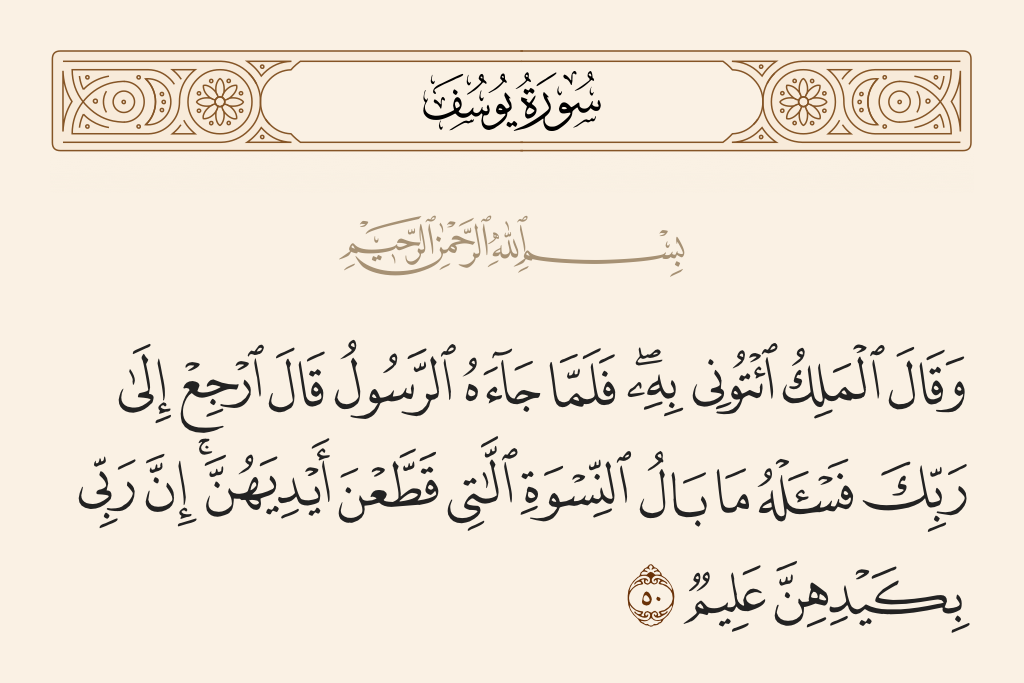Surat Yusuf Verse No. 50: Reading and listening
Translation of the verse 50 from Surah Yusuf : Number of verses 111 - - page 241 - Part 12.

﴾وَقَالَ ٱلۡمَلِكُ ٱئۡتُونِي بِهِۦۖ فَلَمَّا جَآءَهُ ٱلرَّسُولُ قَالَ ٱرۡجِعۡ إِلَىٰ رَبِّكَ فَسۡـَٔلۡهُ مَا بَالُ ٱلنِّسۡوَةِ ٱلَّٰتِي قَطَّعۡنَ أَيۡدِيَهُنَّۚ إِنَّ رَبِّي بِكَيۡدِهِنَّ عَلِيمٞ ﴿
[ يوسف: 50]
And the king said: "Bring him to me." But when the messenger came to him, [Yusuf (Joseph)] said: "Return to your lord and ask him, 'What happened to the women who cut their hands? Surely, my Lord (Allah) is Well-Aware of their plot.
English - Sahih International
And the king said, "Bring him to me." But when the messenger came to him, [Joseph] said, "Return to your master and ask him what is the case of the women who cut their hands. Indeed, my Lord is Knowing of their plan."
Tafheem-ul-Quran by Syed Abu-al-A'la Maududi
(12:50) The king said, "Bring him to me." But when the royal envoy came to him, Joseph said, *42 "Go back to your lord and ask him to enquire about the matter of the women who cut their hands. Indeed my Lord has full knowledge of their cunning. " *43
Tafheem-ul-Quran by Syed Abu-al-A'la Maududi
*42) There is no mention in the Bible and the Talmud of this most important part of the story that Prophet Joseph declined to quit the prison till his character was cleared. On the other hand, according to the Bible, "Then Pharaoh sent and called Joseph, and they brought him hastily out of the dungeon; and he shaved himself, and changed his raiment, and came in unto Pharaoh" . And the Talmud depicts even a more degrading picture of the event. It says, "The king ordered that Joseph should be brought before him. But he commanded his officers to be careful not to frighten the lad, lest through fear he should be unable to interpret correctly. And the servant of the king brought Joseph forth from his dungeon, and shaved him and clothed him in new garments, and carried him before the king. The king was seated upon his throne, and the glare and glitter of the jewels which ornamented the throne dazzled and astonished the eyes of Joseph. Now the throne of the king was reached by seven steps, and it was the custom of Egypt for a prince or noble who held audience with the king, to ascend to the sixth step; but when an inferior or a private citizen of the land was called into his presence, the king descended to the third step and from there spoke with him." (The Talmud, H. Polano, pp. 87-88).
A comparison of the degrading picture in the Talmud with this self -respecting grand, and noble picture depicted in the Qur'an will convince every unbiased critic that the one in the Qur'an is worthy of a Prophet of God. Moreover the picture in the Talmud is open to a grave objection: Had Prophet Joseph behaved like a frightened and cringing lad who was so dazzled by the glitter and glare of the jewels of the throne that he bowed to the ground, how was it that the king and the courtiers were so impressed by him that they declared, "...... the Hebrew has proved himself wise and skilful and through his wisdom shall our country be saved the pangs of want"? So much so that the king appointed him, without demur, as "governor" over the land, "second only to himself". All this shows that by that time he had proved his moral and mental superiority and had enhanced it by his refusal to quit the prison without proving his innocence. Otherwise, they would have never raised him to the highest rank in such a civilized and advanced country as Egypt.
*43) He demanded an enquiry into the matter not because he himself had any doubt of his innocence, but because he was perfectly confident of this: "My Lord has full knowledge of my innocence and of their cunning. But your lord should also make a thorough inquiry as to why I had been sent to prison, for I do not want to go before the public with any blemish or blot on my reputation. Therefore a public enquiry should be held to prove that I was an innocent victim of the injustice of the chiefs and nobles of the country, who had cast me into prison in order to cover up the guilt of their own ladies."
The words in which the demand was made clearly show that the king was already fully acquainted with the details of the incident that had happened at the banquet of the wife of Al-'Aziz. That is why a mere reference to it was enough.
Another note-worthy thing in this demand was that Prophet Joseph did not in any way hint at the part the wife of Al-`Aziz had played in the event. This is another proof of his noble character that he did not like to involve and entangle the wife of his benefactor in the matter, even though she had done him her worst.